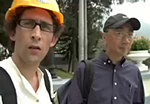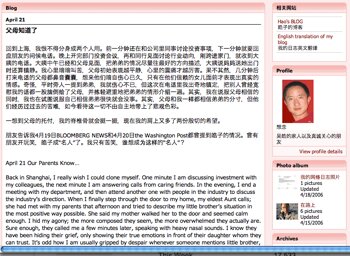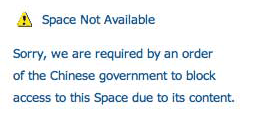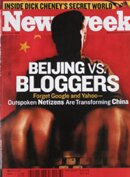
On March 22nd it will be one month since filmmaker and Global Voices Northeast Asia Editor Hao Wu was detained without charge. We appeal to the Chinese government for Hao Wu’s immediate release!
What happened to Hao?
Hao Wu (Chinese name: 吴皓), a Chinese documentary filmmaker who lived in the U.S. between 1992 and 2004, was detained by the Beijing division of China’s State Security Bureau on the afternoon of Wednesday, Febuary 22, 2006. On that afternoon, Hao had met in Beijing with a congregation of a Christian church not recognized by the Chinese government, as part of the filming of his next documentary.
Hao had also been in phone contact with Gao Zhisheng, a lawyer specializing in human rights cases. Gao confirmed to one of Hao’s friends that the two had been in phone contact and planned to meet on Feb. 22, but that their meeting never took place after Gao advised against it. On Friday, Feb. 24, Hao’s editing equipment and several videotapes were removed from the apartment where he had been staying. Hao has been in touch his family since Feb. 22, but judging from the tone of the conversations, he wasn’t able to speak freely. One of Hao’s friends has been interrogated twice since his detention. Beijing’s Public Security Bureau (the police) has confirmed that Hao has been detained, but have declined to specify the charges against him.
The reason for Hao’s detention is unknown. One of the possibilities is that the authorities who detained Hao want to use him and his video footage to prosecute members of
China’s underground Churches. Hao is an extremely principled individual, who his friends and family believe will resist such a plan. Therefore, we are very concerned about his mental and physical well-being.
More about Hao: From Scientist to Computer Guy to Filmmaker.
Hao began his filmmaking career in 2004, when he gave up his job as a senior product manager at Atlanta-based Earthlink Inc. and returned to China to film Beijing or Bust, a collage of interviews with U.S.-born ethnic Chinese who now live in China’s capital city. Before working for Earthlink, Hao worked as a product manager for Internet portal Excite from 2000 to 2001 in Redwood City, CA Before that, Hao had also worked as a strategic planning and product development director for Merchant Internet Group, an intern for American Express Co. and a molecular biologist with UCB Research Inc.
Hao earned an MBA degree from University of Michigan Business School in May 2000 and a Master of Science in molecular and cell biology in July, 1995 from Brandeis University, where he was awarded a full merit-based scholarship. Before studying in the U.S., Hao earned a Bachelor of Science degree in biology from the China University of Science and Technology in Hefei, Anhui province in June, 1992.
Hao the Blogger.
Hao has also been an active blogger, writing as "Beijing Loafer" on his personal blog, Beijing or Bust, named after his film. Due to Chinese government internet blocking of his blog hosting service Blogger.com, he also has a mirror version of the site on MSN Spaces. In early February Hao began contributing as Northast Asia Editor to Global Voices Online, an international bloggers’ network hosted at Harvard Law School’s Berkman Center for Internet & Society. Writing under the pen name Tian Yi, Hao’s contributions aimed to bring citizens’ online voices from China and the rest of North East Asia to readers in the English-speaking world.
Why didn’t we speak out about his detention earlier?
Hao’s family and friends in China have deflected questions about his detention for the past month, as authorities in contact with people close to Hao have urged them not to publicize the case. There had been hope that his detention was only for a short period of time, in which case publicity would not have been helpful.
For more information…
Hao’s family and friends inside China do not want to be interviewed directly by the media at this time, and thus we will not provide journalists with their contact information. We have set up a website dedicated to Hao’s release at: www.freehaowu.org. It will be updated regularly with new information that emerges about Hao’s situation.
All further queries can be e-mailed to: .
(above notice via Rebecca.)
Technorati Tags: asia, china, northeast asia, Free Hao Wu, censorship


 This installment of the Hard Hat Show features Roland Soong of
This installment of the Hard Hat Show features Roland Soong of  SINGAPORE : The Returning Officer for the General Election has ordered the Singapore Democratic Party to take down audio files and podcasts from its website.
SINGAPORE : The Returning Officer for the General Election has ordered the Singapore Democratic Party to take down audio files and podcasts from its website.






 A former police administration officer in Morioka, Iwate Prefecture, has been reported to prosecutors for violating the Swords and Firearms Control Law after taking pictures of handguns and using them on his blog.
A former police administration officer in Morioka, Iwate Prefecture, has been reported to prosecutors for violating the Swords and Firearms Control Law after taking pictures of handguns and using them on his blog.


 Let’s start with a quote from Liu Zhengrong, deputy chief of the Internet Affairs Bureau of the State Council Information Office, recently published in the China Daily:
Let’s start with a quote from Liu Zhengrong, deputy chief of the Internet Affairs Bureau of the State Council Information Office, recently published in the China Daily: Microsoft has also been cowardly, but nothing like Yahoo. Microsoft responded to a Chinese request by recently shutting down the outspoken blog of Michael Anti (who now works for the New York Times Beijing bureau). Microsoft also censors sensitive words in the Chinese version of its blog-hosting software; the blogger Rebecca MacKinnon found that it rejected as "prohibited language" the title "I Love Freedom of Speech, Human Rights and Democracy."
Microsoft has also been cowardly, but nothing like Yahoo. Microsoft responded to a Chinese request by recently shutting down the outspoken blog of Michael Anti (who now works for the New York Times Beijing bureau). Microsoft also censors sensitive words in the Chinese version of its blog-hosting software; the blogger Rebecca MacKinnon found that it rejected as "prohibited language" the title "I Love Freedom of Speech, Human Rights and Democracy." Cisco sells equipment to China that is used to maintain censorship controls, but as far as I can tell similar equipment is widely available, including from Chinese companies like Huawei. Cisco also enthusiastically peddles its equipment to the Chinese police. In short, Cisco in China is a bit sleazy but nothing like Yahoo.
Cisco sells equipment to China that is used to maintain censorship controls, but as far as I can tell similar equipment is widely available, including from Chinese companies like Huawei. Cisco also enthusiastically peddles its equipment to the Chinese police. In short, Cisco in China is a bit sleazy but nothing like Yahoo. Google strikes me as innocent of wrongdoing. True, Google has offered a censored version of its Chinese search engine, which will turn out the kind of results that the Communist Party would like (and thus will not be slowed down by filters and other impediments that now make it unattractive to Chinese users). But Google also kept its unexpurgated (and thus frustratingly slow) Chinese-language search engine available, so in effect its decision gave Chinese Web users more choices rather than fewer.
Google strikes me as innocent of wrongdoing. True, Google has offered a censored version of its Chinese search engine, which will turn out the kind of results that the Communist Party would like (and thus will not be slowed down by filters and other impediments that now make it unattractive to Chinese users). But Google also kept its unexpurgated (and thus frustratingly slow) Chinese-language search engine available, so in effect its decision gave Chinese Web users more choices rather than fewer.






































